Ways executives can build trust: Edelman Trust Barometer
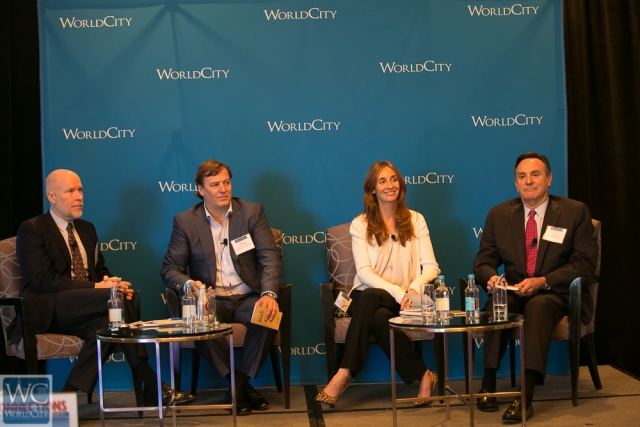
Every year, public relations firm Edelman surveys people around the globe on how much they trust business, media and other institutions. Trust usually rises in some groups and falls in others – but not in the latest survey.
For the first time in 15 years, Edelman found trust fell globally in three of four institutions: non-governmental organizations, business and media. Trust ticked up in government but remained low.
Weaker levels of trust worldwide signal a need for executives to shift how they operate: to become more transparent in public reporting, to respond more to customer concerns, and to engage more with the general public on social media – to name just a few ways to boost trust in their organizations.
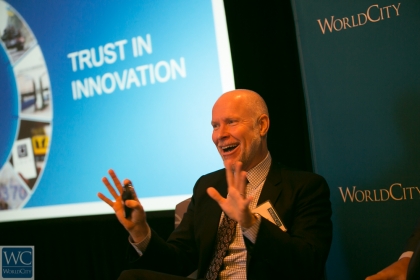
Ben Boyd, a senior executive with Edelman. Photos by Carlos Miller
Ben Boyd, a senior executive with Edelman, shared those insights at WorldCity’s Global Connections on Feb. 27 in a presentation summarizing the 2015 Edelman Trust Barometer. The report found a drop in the portion of countries considered “trusters” from 30 percent to 22 percent, down to an all-time low.
Trust is waning, partly because of the torrid pace of innovation in everything from food to fuel to work. The public now distrusts genetically modified foods and hydraulic fracturing, and it’s worried about government’s capacity to regulate businesses too often motivated by greed. By a 2-to-1 margin, respondents felt innovation in business is too fast and not adequately tested, the survey showed.
Boyd offered a special look into results from Latin America, accompanied by three panelists active in Latin American business. The group agreed that new technologies such as smartphones make it easier for the public to seek information and draw their own conclusions, changing previous dynamics of trust.
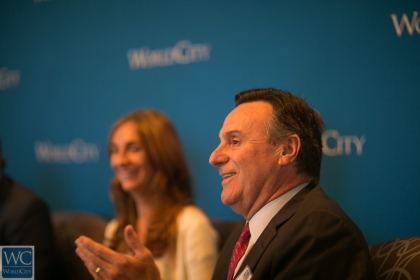
Jose M. Aldrich, vice dean at Florida International University’s College of Business
“Shift happens,” joked panelist Jose M. Aldrich, vice dean at Florida International University’s College of Business. New technologies have altered the way we consume media, for example, boosting reliance on online search engines and undermining the strength of traditional media, said Aldrich.
By institution, Boyd offered these insights on 2015 results compared to Edelman’s 2014 report:
· Trust in NGOs fell from 66 percent to 63 percent.
· Trust in business fell from 59 percent to 57 percent.
· Trust in media fell from 53 percent to 51 percent.
· Trust in government rose from 45 percent to 48 percent, still the lowest in a major institution.
The tally came from surveys conducted online with 33,000 people late October and early November. Respondents came from 27 nations including three in Latin America: Brazil, Argentina and Mexico.
Of course, not all markets followed the general pattern. In Brazil, for example, trust in business rose from 70 percent to 73 percent, and business was the most trusted institution, the survey showed.
In Argentina, trust in business fell from 58 percent to 46 percent, among the biggest drops worldwide. Argentina overall was among “distruster” nations, the study showed.
Media: Be online and easily found
More than any other institution, trust in media has been revolutionized by technology. In 2015, for the first time, online search engines eclipsed traditional media as the most trusted source of news and information for the “informed” public, a higher-income group comprised of major consumers of news.
The lesson for business: “If you want to be effective, you better be found” on search engines, Boyd said.
Trust in business: Ownership, country of origin matter
For business, four major factors influence trust: industry sector, country of origin, enterprise type and leadership. Globally, trust has been growing in those key areas since the global recession in 2008, but declined in the past year, the survey showed.
Worldwide, technology remains the most trusted of industry sectors, but trust in tech-related industries slipped in 2015, partly because of concerns over privacy and over security breaches, the study found.
A company’s home base also matters, and companies based in the emerging markets of Brazil, Russia, India and China garner the least trust. In contrast, firms from Sweden, Canada, Switzerland and Germany command the most trust worldwide, according to the survey.
By type of enterprise, family-owned businesses carry a trust premium of nearly 30 percentage points in developed nations. But big business is most trusted in emerging nations, the survey showed.
Consumers in developing nations often trust global companies more than local firms, because global firms tend to operate with higher standards, spurred partly by watchdog consumer groups in their home markets, said panelist Santiago Gowland, managing director of The Nature Conservancy for the Latin American region and a former executive with Nike and Unilever.
Instead family firms tend to be more trusted in developed nations, because they’re often seen as more values-based and community-minded than global companies reliant on stock markets, surveys showed.
But the difference is not always clear-cut. “Family-owned businesses in Argentina and Brazil are the big businesses, ” said audience member Carlos Huerta, president of PLC International, a smart-grid and telecom solutions provider for more than 30 years.
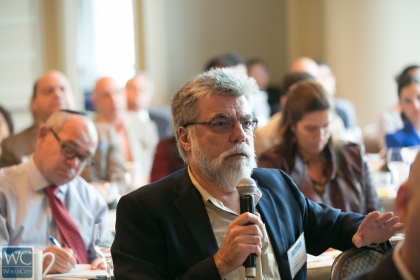
Carlos Huerta, president of PLC International
Leadership: Mobilize academics, every-day people
On leadership, surveys found the most credible spokespersons for business to be academics or industry experts, followed by a company’s technical expert and “someone like yourself.”
CEOs in contrast trailed in commanding trust.
The take-away for companies: Engage more people like your audience to tell your story, using social media and relying less on the CEO as a public spokesman, said Boyd.
Trust differs by age group, gender
Audience members had plenty of questions.
“Are there generational differences in trust?,” asked Manuel Pila, who works in economic development for the city of Doral.
When it comes to media, Millennials worldwide tend to trust digital media more so than older generations, especially online search engines, said Boyd. Data from 20 countries found Millennial’s trust in online search engines at 72 percent, compared to 64 percent for the “informed” public in general.
Women also tend to trust more than men do, said Boyd.
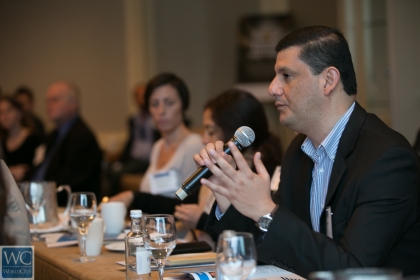
Daniel Quiroga, who leads marketing and sales for the Caribbean and Central America for DHL
How effective are governments in influencing trust in media?, asked Alfredo Fuchs, vice president for client services at Right Management Florida/Caribbean.
In Argentina, for example, the government has bought control in newspapers and other media to spread its message. But with trust in the Argentine government low, “the government drags trust in media down,” said Gowland of The Nature Conservancy.
In the end, trust is like reputation, said Daniel Quiroga, who leads marketing and sales for the Caribbean and Central America for DHL: “It takes 20 years to build a reputation and five minutes to lose it.”
That’s why it’s so important for companies today to look beyond legal compliance, said panelist Laura Juanes, an attorney who heads up international privacy for online search engine Yahoo.
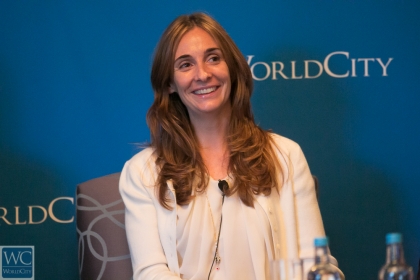
Laura Juanes, an attorney who heads up international privacy for online search engine Yahoo.
There’s a real opportunity now for institutions to collaborate, added Gowland, “for business, NGOs, academia and government to partner better to really solve people’s problems.”
Global Connections is one of five event series organized by WorldCity to bring together executives in greater Miami on international business topics. The Global series is sponsored by Edelman, FIU Business and air-conditioning systems maker Daikin.
The next Global Connections is set for March 27 on “Women at the top: A conversation with today’s executive leaders.”